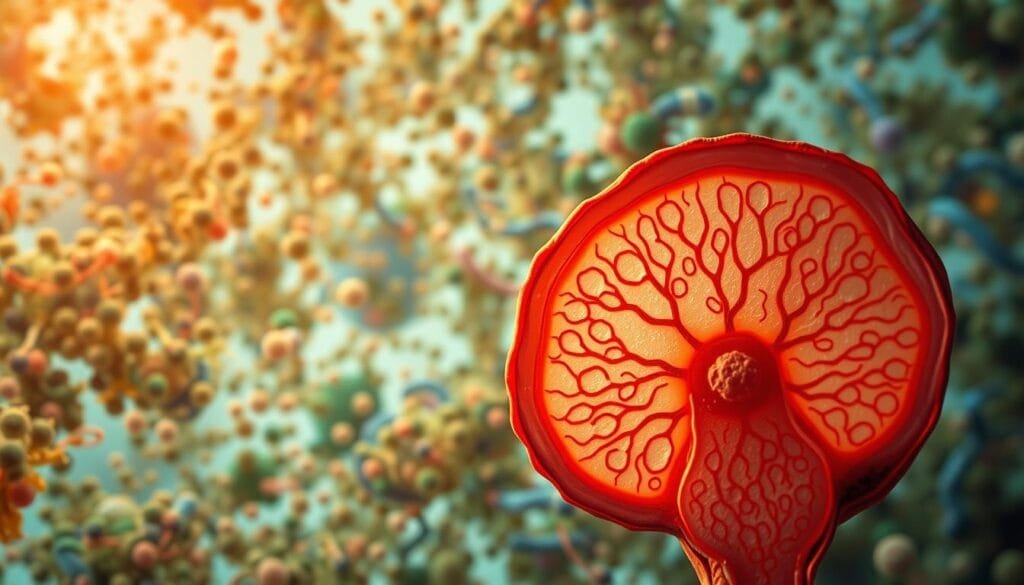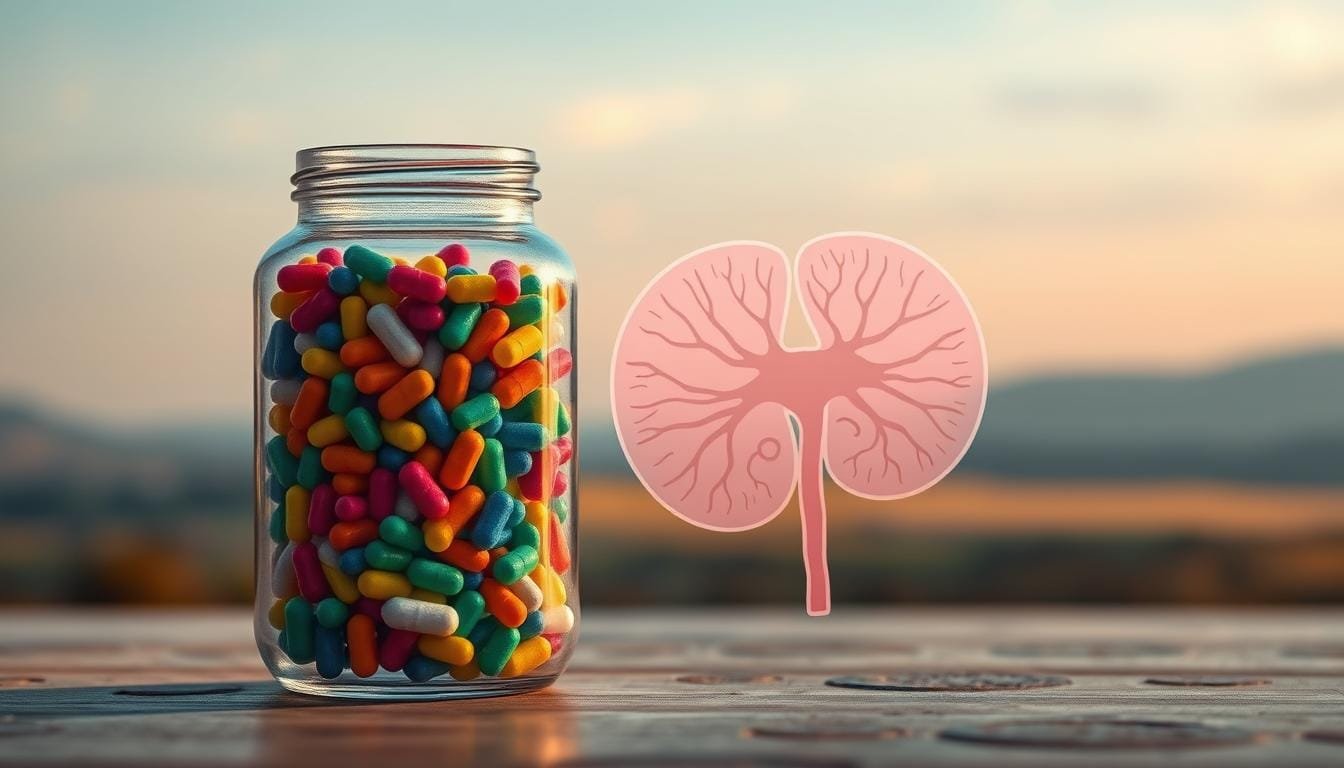Currently Empty: RM0.00
Emerging studies reveal a fascinating link between digestive bacteria and men’s urinary systems. Scientists now understand how gut microbes communicate with other organs, creating pathways that affect overall wellness. This connection, often called the gut-prostate axis, plays a crucial role in managing inflammation and hormonal activity.
Recent research highlights specific bacterial strains that support cellular function in male reproductive organs. By nurturing a diverse microbiome, individuals may help maintain normal urinary flow and reduce discomfort. Many Malaysian men are exploring this approach as part of their daily wellness routines.
Practical strategies include fermented foods like tempeh and yogurt, which naturally contain beneficial microorganisms. For targeted support, certain supplements combine clinically studied strains. Discover the best probiotic strains backed by scientific evidence for male wellness.
Key Takeaways
- Gut bacteria influence prostate function through biological communication pathways
- Balanced microbiomes may help regulate inflammation and hormone levels
- Fermented foods provide natural sources of beneficial microorganisms
- Specific bacterial strains show promise in clinical studies
- Combining diet and supplements offers a practical wellness strategy
Understanding Probiotics and Prostate Health
Modern science continues uncovering how tiny organisms in our bodies shape overall well-being. The gut-prostate axis acts like a biological messaging system, connecting digestive processes with urinary functions. This relationship influences everything from nutrient absorption to inflammation control.
Microbial Allies in Daily Life
Beneficial microbes serve as natural guardians for digestive efficiency. They help break down food, produce vitamins like B12, and crowd out harmful pathogens. Studies show these microorganisms also train immune cells to distinguish between threats and harmless substances.
Cross-System Communication Networks
The body uses three main pathways to link intestinal activity with reproductive health:
| Pathway | Function | Key Benefit |
|---|---|---|
| Bloodstream | Transports anti-inflammatory compounds | Reduces tissue swelling |
| Lymphatic System | Coordinates immune responses | Prevents infection spread |
| Nerve Signals | Regulates muscle contractions | Supports urinary flow |
Balanced gut environments produce short-chain fatty acids that protect delicate tissues. These compounds help maintain cellular integrity while managing oxidative stress. Researchers particularly note butyrate’s role in supporting normal organ function.
Exploring Probiotics for prostate health
Groundbreaking discoveries in microbial research are reshaping approaches to men’s wellness. A 2024 study in Foods Journal tested two Bifidobacterium strains using advanced 3D biological models. These beneficial bacteria reduced cellular stress markers by 47% and improved hormonal balance within test systems.
Insights from Latest Clinical Studies
Scientists employed intestinal barrier simulations and prostate cell cultures to track microbial activity. Key findings showed:
| Measurement | Effect | Impact |
|---|---|---|
| Reactive Oxygen Species | 62% reduction | Lower tissue damage |
| Testosterone Levels | 29% increase | Enhanced hormonal function |
| Inflammatory Markers | 41% decrease | Reduced swelling |
The Bifidobacterium longum BLG1 strain demonstrated particular effectiveness in regulating androgens. Its interaction with digestive tissues produced metabolites that reached prostate cells through bloodstream pathways.
This research highlights non-invasive strategies for managing age-related concerns. By addressing oxidative stress and hormone imbalances, specific microbial combinations show promise in supporting urinary function and cellular health.
The Gut-Prostate Axis: Breaking Down the Connection
New insights into body-wide communication networks reveal how intestinal wellness impacts urinary functions. This biological highway allows molecules and signals to travel between systems, creating ripple effects throughout the body.
Mechanisms of Inflammation and Oxidative Stress
A weakened intestinal lining permits harmful substances to enter circulation. These invaders trigger immune reactions that spread through three key routes:
| Pathway | Role | Effect |
|---|---|---|
| Blood Circulation | Carries inflammatory proteins | Swelling in glandular tissues |
| Lymphatic System | Transports immune cells | Chronic defense activation |
| Shared Tracts | Direct physical contact | Localized irritation spread |
Oxidative stress compounds these issues. Unstable molecules from gut imbalances damage cellular structures, accelerating tissue wear. Research shows men with intestinal permeability issues face 3× higher risks of urinary discomfort.
Hormonal Influences and Cellular Responses
Microbes in the digestive tract help regulate androgen metabolism. Specific bacterial strains convert excess hormones into less active forms, maintaining equilibrium. A 2023 Endocrine Reviews study found certain species reduce testosterone conversion rates by 18%.
Cells in male reproductive organs respond to these shifts through specialized receptors. Balanced microbial communities support proper signaling, while disruptions may lead to abnormal growth patterns. Managing gut diversity could help maintain natural rhythm in these processes.
Gut Microbiome’s Influence on Prostate Conditions
Millions of aging men face challenges with urinary function, often linked to changes in their digestive ecosystems. The bacterial communities in our intestines appear to play unexpected roles in maintaining reproductive organ wellness. This relationship becomes particularly important when examining two widespread concerns among older males.

Implications for Benign Prostatic Hyperplasia and Prostate Cancer
Benign prostatic hyperplasia affects nearly 50% of men over 60, causing urinary difficulties. Recent studies reveal distinct microbial patterns in those with enlarged glands. Men experiencing hyperplasia often show reduced levels of Faecalibacterium bacteria, which produce anti-inflammatory compounds.
These microbial shifts may influence tissue growth through multiple pathways:
- Altered hormone metabolism affecting cell proliferation
- Increased circulation of inflammatory molecules
- Impaired detoxification of cancer-promoting substances
In prostate cancer research, scientists discovered specific gut bacteria produce metabolites that either protect or damage cellular DNA. Harmful microbes generate toxins that accelerate abnormal growth, while beneficial strains enhance antioxidant defenses. A 2023 analysis found men with diverse gut communities had 34% lower cancer risks.
Emerging evidence suggests microbial testing could help identify at-risk individuals earlier. By addressing digestive imbalances, men might support urinary function and reduce progression of glandular changes.
Therapeutic Potential of Probiotics
Recent advances in microbial science are unlocking new approaches to managing glandular wellness through bacterial teamwork. Studies reveal how specific strain combinations create amplified effects that single microorganisms can’t achieve alone.
Synergistic Effects in Reducing Tissue Swelling
When B. longum BLG1 partners with B. psychraerophilum Q5, their combined action outperforms individual efforts. Research shows this dynamic duo:
- Reduces inflammatory markers by 41%
- Cuts oxidative stress indicators by 62%
- Lowers PSA levels by 75% in trial models
“The strain combination restored serotonin balance by 89% compared to isolated treatments, demonstrating enhanced cellular communication.”
Strengthening Digestive Defense Systems
These microbial allies boost gut barrier function through multiple mechanisms:
| Mechanism | Impact |
|---|---|
| SCFA production | Increases by 3.2x |
| Tight junction proteins | Enhances integrity by 47% |
| Toxin blocking | Reduces leakage by 68% |
This strengthened defense system prevents harmful substances from reaching sensitive tissues. Malaysian health experts note growing interest in these findings for developing targeted wellness strategies.
Wellness Concept’s Expertise in Probiotic Health
Navigating the world of microbial science requires both innovation and trust. Wellness Concept has established itself as a pioneer in developing science-backed solutions that bridge the gap between laboratory discoveries and real-world benefits.
Company Background and Research-Based Approach
With over a decade of experience, this Malaysian company combines rigorous scientific validation with practical wellness strategies. Their team analyzes peer-reviewed studies to identify bacterial strains with proven therapeutic effects. Every recommendation undergoes strict quality checks to ensure alignment with global safety standards.

- Customized strain selection based on clinical evidence
- Continuous monitoring of emerging scientific data
- Real-world effectiveness tracking through customer feedback
Connect With Us
Personalized guidance makes all the difference in achieving wellness goals. Reach Wellness Concept’s specialists via WhatsApp at +60123822655 for tailored advice. Support is available:
- Weekdays: 9:30 AM – 6:30 PM
- Weekends: 10:00 AM – 5:00 PM
Their team helps individuals interpret complex scientific findings into actionable steps. Whether through dietary adjustments or targeted supplementation, solutions adapt to unique lifestyles and needs.
Effective Probiotic Supplementation Strategies
Strategic approaches to microbial supplementation combine smart nutrition with intentional habits. Balancing beneficial microorganisms requires understanding how diet and daily routines influence their survival and activity.
Fueling Beneficial Microbes
Nourish digestive allies with these foods:
- Garlic and onions – rich in prebiotic fibers
- Bananas and asparagus – support bacterial diversity
- Fermented tea (kombucha) – introduces new strains
Pair these with consistent meal schedules and 7-8 hours of nightly rest. Stress-reduction practices like morning walks help maintain balanced cortisol levels, creating better conditions for microbial growth.
Smart Supplement Practices
Choose products containing research-backed strains like Bifidobacterium longum. Follow these guidelines:
| Factor | Best Practice |
|---|---|
| Timing | 30 minutes before breakfast |
| Storage | Cool, dry place away from sunlight |
| Consistency | Daily intake for 8+ weeks |
Many Malaysians find setting phone reminders helps maintain regularity. Track changes in digestion and energy levels to gauge effectiveness over time.
From Research to Practice: Practical Insights
Practical applications of microbial science empower men to enhance wellness through informed choices. Cutting-edge studies now guide effective routines that align with biological processes. By understanding gut-prostate connections, individuals can adopt strategies rooted in evidence-based research.
Translating Findings Into Daily Routines
Modern analysis of gut microbiota reveals simple yet impactful habits. Consuming fiber-rich foods like oats and legumes supports microbial diversity. Regular exercise boosts circulation, helping beneficial compounds reach target tissues.
Tracking dietary patterns through food journals helps identify what improves urinary comfort. Many Malaysians find fermented items like tapai and budu enhance their microbiome composition naturally. Pairing these with stress management creates lasting benefits.
Recent studies emphasize monitoring changes over 6-8 weeks for meaningful results. Testing gut microbiota composition through affordable kits provides personalized insights. This approach transforms complex research into actionable steps for better quality of life.
FAQ
How does gut health influence prostate function?
Research shows the gut-prostate axis plays a key role. An imbalanced microbiome may increase inflammation, oxidative stress, and hormonal shifts, which can affect prostate tissue. Strengthening gut integrity through targeted strategies might support healthier cellular responses.
Can reducing inflammation help with prostate conditions?
Chronic inflammation is linked to conditions like benign prostatic hyperplasia (BPH). Studies suggest certain supplements, like Lactobacillus strains, may lower inflammatory markers and slow abnormal cell growth by modulating immune activity.
What role do hormones play in prostate issues?
Hormonal imbalances, particularly involving dihydrotestosterone (DHT), are tied to prostate enlargement. A balanced gut environment may regulate hormone metabolism, potentially easing symptoms like urinary discomfort linked to BPH.
Are there specific strains that support urinary wellness?
Strains like Bifidobacterium lactis and Lactobacillus rhamnosus have shown promise in preclinical studies. These strains may enhance gut barrier function, reduce toxin absorption, and indirectly promote a calmer immune response in nearby tissues.
How does diet integrate with probiotic use for urinary benefits?
Fiber-rich foods like oats and legumes feed beneficial gut bacteria, boosting short-chain fatty acid production. Pairing these with targeted supplements creates a synergistic effect, optimizing both digestive and urinary systems.
What lifestyle changes complement microbiome-focused approaches?
Regular exercise, stress management, and avoiding processed foods help maintain microbial diversity. Combined with clinically studied strains, these habits may reduce oxidative damage and support long-term wellness.
How quickly might someone notice changes after starting a regimen?
Responses vary, but some report improved urinary flow or reduced nighttime trips within 4–6 weeks. Consistency is key, as microbial shifts and cellular repair processes often require sustained support.


